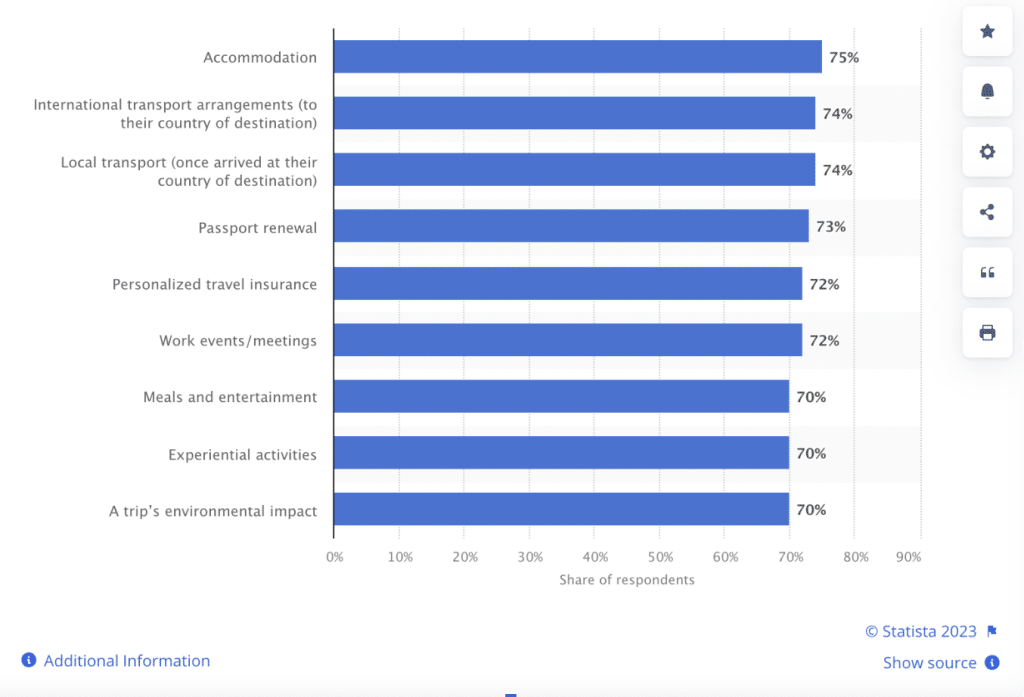
The travel industry is poised to undergo a significant transformation in the forthcoming years. The emergence of artificial intelligence (AI) presents boundless possibilities for both travelers and tour operators. This advanced technology is set to shape the industry in numerous ways and have a profound impact on its operations.
Artificial intelligence and tourism: a growing partnership
AI is swiftly revolutionizing the landscape of the travel industry. In recent times, this cutting-edge technology has permeated almost every aspect of the industry, encompassing tasks like flight and accommodation bookings, as well as crafting tailored travel recommendations for specific destinations.
According to a research conducted by the World Travel & Tourism Council, AI and machine learning have the potential to boost global travel and tourism economic activity by a staggering $1 trillion by 2025. The study highlights the growing prominence of AI-driven features, including intelligent personalization, automated customer service, voice recognition, virtual reality, and facial recognition.
The accompanying graph sourced from Statista illustrates the proportion of travelers who are willing to place their trust in AI for trip planning purposes in the year 2023.
 Source: Statista
Source: Statista
Advantages of AI in the Tourism Sector
Employing AI technology in the tourism industry has the potential to bring about a remarkable transformation when implemented effectively. By harnessing the power of AI, businesses can enhance efficiency, reduce costs, and provide superior customer experiences.
- Process Automation: Artificial intelligence facilitates the automation of manual tasks within the tourism sector, such as flight and hotel bookings, as well as restaurant recommendations. This not only saves time and money for businesses but also minimizes errors throughout the process.
- Enhanced Security: Artificial intelligence can be employed to bolster security in the travel and tourism industry by detecting fraudulent activities and malicious behavior. Utilizing AI-based facial recognition systems, for instance, ensures that only authorized individuals can access secure areas at airports and other travel destinations.
- Personalized Customer Experiences: Artificial intelligence enables the personalization of customer experiences by offering targeted recommendations based on their past research and preferences. This tailored approach enhances customer satisfaction and engagement.
- Accurate Forecasting: AI-powered analytics assist businesses in the travel and tourism industry in making precise forecasts regarding customer demand and pricing. This enables them to plan effective marketing strategies and optimize the allocation of available resources.
Overall, by incorporating AI into their operations, businesses in the tourism sector can benefit from streamlined processes, heightened security measures, personalized experiences for customers, and improved decision-making through accurate forecasting.
The Prospects of AI and Machine Learning in the Travel Industry
The convergence of artificial intelligence (AI) and machine learning (ML) is progressively becoming a tangible reality. These technologies hold vast potential for travel companies to enhance customer experiences by making them more seamless, personalized, and efficient.
The integration of AI and ML can simplify the booking process through the development of chatbots capable of addressing customer inquiries and guiding them through the process. Furthermore, AI can analyze customer data to create hyper-personalized experiences tailored to their preferences and interests. It can also facilitate automated tracking and monitoring of customer service complaints, enabling companies to improve overall customer satisfaction.
AI and ML are instrumental in enhancing search engine optimization (SEO) for travel industry firms. AI-powered SEO tools can analyze the behavior of potential customers, facilitating the customization of web content and targeting those most likely to make a purchase.
Another significant application of AI and ML in the travel industry is forecasting. Airlines, airports, and hotel chains utilize AI-powered forecasting tools to predict customer demand and make appropriate preparations. AI models can also forecast flight delays and recommend alternative routes, minimizing disruptions for customers.
AI and ML prove invaluable in occupancy forecasting, enabling travel companies, particularly hotels, to accurately predict room occupancy levels and adjust prices accordingly, maximizing profitability.
Lastly, AI-enabled translations are revolutionizing customer interactions with travel companies. Through AI-powered natural language processing (NLP) technologies, travel companies can swiftly translate websites, emails, documents, and customer service conversations into different languages. Many airlines, hotels, and travel agencies have already embraced this technology.
AI-based innovations in the travel and hospitality industry
Let’s summarize the areas of AI-based advancements:
- Customer Support: AI-powered chatbots are gaining popularity in the hospitality industry as they swiftly provide customers with the information they seek, eliminating the need for direct customer service contact.
- Predictive Analytics: AI has enabled the creation of intelligent search algorithms, facilitating customers in finding the most favorable flight and accommodation deals.
- Automated Processes: AI streamlines hotel operations by automating time-consuming tasks like check-in, check-out, and inventory management. Furthermore, AI enhances hotel security through facial recognition software, identifying potential threats.
- Geolocation: AI applications in the travel industry have led to smarter navigation systems, assisting travelers in navigating unfamiliar locations. These systems offer insights into traffic patterns and provide personalized route recommendations for commuters.
- Marketing and Consumer Sentiment: AI plays a crucial role in marketing by tracking customer behavior and personalizing offers. Through the analysis of customer interactions, AI enables companies to target their campaigns effectively and consistently provide the most attractive deals.

